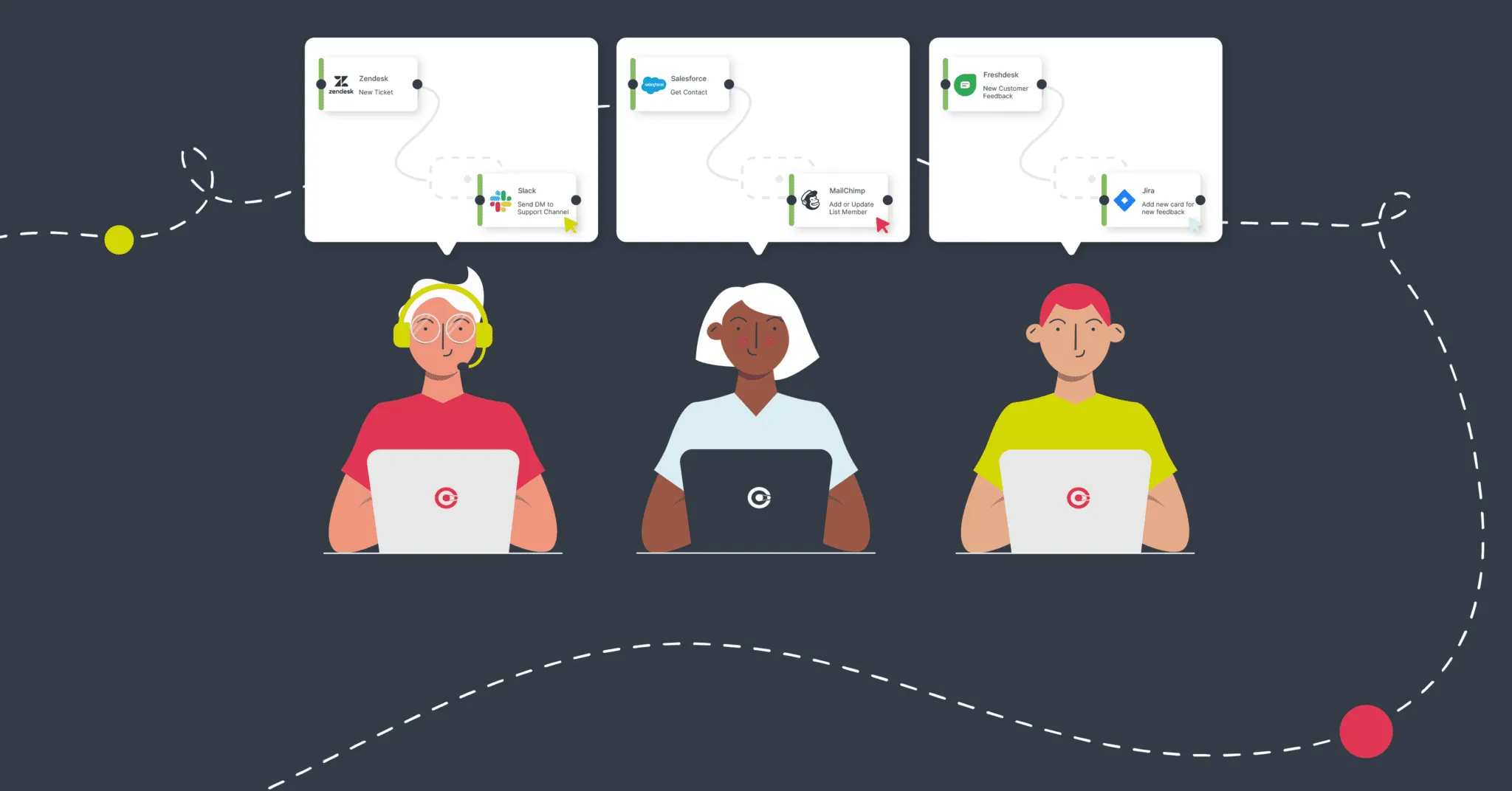
Updated on by Hayley Brown
Who are Citizen Integrators?
Gartner has proposed that everyday people can become developers, termed ‘citizen integrators’. These individuals are able to take advantage of corporate IT-sanctioned development and runtime environments, which allow them to combine APIs through drag-and-drop applications.
This low-code and no-code software enables a larger workforce to create custom-made applications which can then be scaled and adapted to meet the demands of the business and or customer. Citizen developers are capable of understanding the requirements of the business and can come up with multiple solutions for a single problem.
Characteristics of Citizen Integrators
Citizen integrators can come from anywhere within an organisation. They are considered experts in their department and more specifically the department’s workflow and data.
For example, a Marketing Specialist who wants to integrate the marketing platform with a CRM. Alternatively, a Finance Manager who wishes to integrate finance information from several different sources into one dashboard.
Typical characteristics of citizen integrators include:
- Those who understand client needs
- They are subject matter experts
- They have some or are interested in technical skills
- Those who use reports, analytics, etc.
- They understand the data, where it comes from and where it needs to go to
- Those who understand the business needs
- They are eager to learn the day-to-day process
Those with these particular characteristics are deemed most capable to take on a citizen integrator role.
Different Department Citizen Integrator Examples
Sales Lead
- A sales lead may want to add a new sales lead and prospect to their CRM as contacts to track the progress of the sale.
Product Manager
- A product manager could build an integration to help manage customer feedback which then feeds into a project management application as cards for product roadmap consideration.
Support
- A support team may build integration so that when a new customer ticket is received a direct message or notification is sent to a communication channel or the support lead for distribution.
Customer Success
- A customer success team may want to add data from multiple systems and sources into one dashboard to help them track customer health. As well as upsell opportunities.
How does Citizen Integrators help your business?
Citizen integrators are one key way that can help your business not only grow but improve service, experience and productivity.
For instance, citizen integrators are a great way of expanding your technical workforce and removing the reliance on traditional IT departments. One common reason IT projects fail is that there is a lack of requirement understanding. As citizen integrators are domain experts they are familiar with the workflows and data they need. As a result, it can improve the quality of the service provided and the project delivery.
Another way they help business is by boosting productivity. Data can quickly become bottlenecked and siloed. This results in a lack of information sharing. Due to citizen integrators’ expert knowledge in the specific domain, they are able to build the necessary integrations required to improve the data workflow and boost productivity. As well as expand data access across the organisation which helps remove the friction associated with integration.
Utilising citizen integrators also reduces the burden on IT. Teams are no longer waiting for long periods of time for resources to become available for integration projects to be built. As a result, the developer backlog is reduced and they are able to focus on core product features and strategic projects.
Employee satisfaction rates are continually in flux so upskilling existing employees to take on new technical skills required to be a citizen integrator with low code and now code tools can empower them to accomplish their job. As well as increase their satisfaction and connection to their work. As a result, it’ll help your business towards its digital transformation goals.
Other benefits include:
- A reduction in manual tasks
- Improved project deployment rates
- Easy and quick maintenance
- Improved business agility
Tools Citizen Integrators Use
Low-code tools are one-way citizen integrators can build integrations as they possess the components of Extract, Transform and Load (ETL) to build a data workflow. These tools are typically designed with an intuitive user interface and drag-and-drop functionality for ease of integration building.
Pre-built connectors are typically a feature of low-code tools. These API connectors are already programmed with the necessary code to integrate various systems. For instance, connecting a marketing platform with a CRM is easy as the methods/endpoints already exist. For example, add a new subscriber to CRM contacts. This means citizen integrators can string together these APIs to build a data workflow.
Another feature within low-code tools is integration templates. These templates exist for common use cases requested by your customers to popularly used APIs. Citizen integrators can simply need to authenticate and map the data. Alternatively, they can duplicate and add further customisation for specific customers.
Tools like embedded iPaaS Cyclr, can help empower your citizen integrators, scale your existing integrations and provide additional integration functionality across your organisation and satisfy your customers.
Talk to one of our integration experts today.